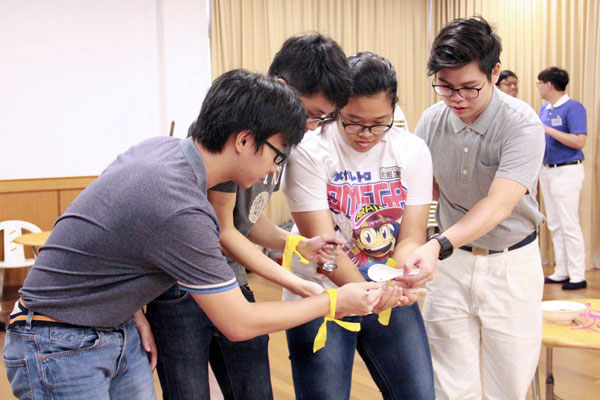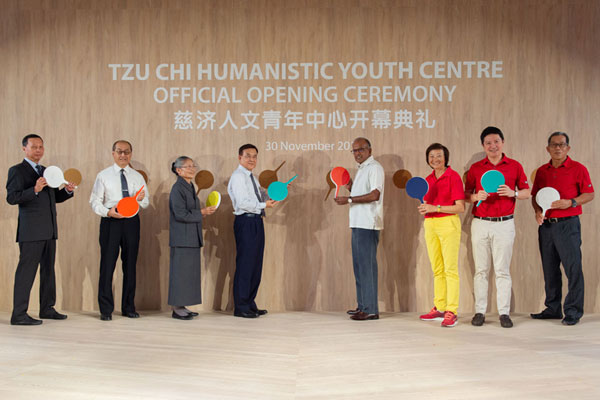
150 people attended the medical talk and student recruitment drive given by Tzu Chi University. (Photo by Chai Jiuan Hua)
On 16 August, Prof Tseng Guo-fan, Vice President of Tzu Chi University, Dr Yang Jen-hung, Dean of TCU’s School of Medicine, alongside a staff member from the University’s Office of International Affairs were in Singapore for an exchange session with the School of Medicine of National University of Singapore. Tzu Chi Singapore took the opportunity to invite them to give a medical talk and TCU student recruitment briefing at Jing Si Hall.
Dressed immaculately and with a constant smile on his face, Prof Tseng showed no air of authority around him. One would not have guessed that the gentleman is the Vice President of Tzu Chi University (TCU) and anatomy professor in its School of Medicine. The VP, who also heads the University’s Medical Simulation Centre and is a frequent visitor to Singapore for medical conferences, spoke candidly about the mission and philosophy of his University on stage.
Located in Hualien city, Tzu Chi University was established by Master Cheng Yen who is also the founder of Tzu Chi Foundation. For the past 18 years, the University has gradually become a renowned private university in Taiwan. It was originally established as Tzu Chi College of Medicine in 1994, and the name was later changed to Tzu Chi University in 2000. The affiliated primary and secondary schools were set up in 2000, thus establishing a comprehensive education programme from kindergarten up to Ph.D. level.
For more than 15 years, Tzu Chi has advocated body donation for medical study and research. Its medical school has been a pioneer in Taiwan in using donated corpses for anatomy instruction and hands-on surgical simulation. Medical students and veteran surgeons alike have learned much from this programme. Many of them have gained more than medical skills – they have also learned to cultivate a sense of gratitude to the cadavers, whom they reverently name their Silent Mentors.
Producing ethical doctors has long been the basis of education for TCU’s School of Medicine. The medical school currently has 30,000 body donation agreements signed. By pushing for body donation for medical education purposes and appealing for donation, Master Cheng Yen has been successful in gradually eradicating the Chinese belief of ground burial for body preservation and promoting social respect for body donors. Corpses on the operating tables in the medical college are no longer regarded as cold bodies but real people with real stories. Starting with the commemoration of the donors, the funeral proceedings, memorial service with the donors’ friends and family and finally, the cremated remains being set in Tzu Chi's columbarium, every procedure is carried out with utmost respect so as to honour these selfless teachers,as well as to teach students about respect.
Bringing an end to his sharing session, Prof Tseng described his hope for the University, “Tzu Chi University is a unique university still in its early days. It has its own big dreams, and that is to light up the society with a unique way of teaching.”
The Art of Observation
Starting his talk, Dr Yang Jen-hung asked the audience if one look was all it took for a doctor to diagnose a patient and also, whether seeing was really believing.
The Dean of TCU’s School of Medicine pointed out that doctors sometimes suffer from ‘inattention blindness’. Being a dermatology physician, he quibbled that doctors tend to only see a problem when there is expected to be one, completely ignoring and thus missing the problem arising from somewhere they do not expect. According to Dr Yang, doctors need to learn how to be more observant, paying attention to what they expect as well as what they don't expect. Coupling sound reasoning with attentive observation, a precise diagnosis can be achieved, he added. To highlight the importance of this point, he quoted examples of real dermatological cases where misdiagnosing has caused patients to lose their good health and in some cases, even led to their death.
Dr Yang believes that good medical training does not only involve lectures and tutorials, but also learning on the job through doctor-patient interaction and consultation. In fact, he emphasized that the patient is a doctor’s best mentor. Recognizing the importance of observation, TCU’s School of Medicine has a special programme to hone students’ observation skills through drawing and painting sessions.
Touched hearts
“I find it absolutely amazing that corpses can be used for surgical simulation! But I am more moved by the sacrifice of the Silent Mentors,” said 26-year-old Economics student Zhang Ying Jie. His friend Lim Hui Li agreed, “Most people tend to cling to their body and insist on having a ground burial. These ‘Silent Mentors’ who donated their bodies for medical education are truly selfless.”
Zhang plans to pursue Buddhist studies in Fo Guang Shan College in Taiwan after completing his studies in Singapore. He was moved by the humanistic values he felt from the talk tonight. “Growing up successfully has always been measured by how many skills one possesses. What I have seen at Tzu Chi today is love and respect between people. It has given me a lot to think about,” said the Economics student. He approached Dr Yang after the talk to express his interest in visiting Tzu Chi during his stay in Taiwan.
Year 4 medical students Wang Qing Liang and Su Pei Fang from the National University of Singapore had come all the way from the West Coast that evening. They attended TIMA* member and NUS Professor Ng Yee Kong’s anatomy class which gave them a very profound impression. The duo plans to attend anatomy lessons in Tzu Chi University next year.
Wang said, “I can feel from tonight’s talk that Tzu Chi medical school is not just about teaching skills, it’s also about love and respect. This is very important because we need to get to know our patients and learn to love, respect and treat them from the heart – not just treating the symptoms.”
Zheng Shu Hui, a second year student from Nanyang Technological University came with her grandmother, Nge Kim Ngey, who is also a Tzu Chi commissioner. Before the talk, Zheng’s plan was to further her studies in a local university. Now, she has a new plan. She approached Dr Yang after the talk to find out more about applying to Tzu Chi University.
“Tzu Chi hospital is very unique. I would really love to study in Tzu Chi University after listening to the talk today,” said the girl whose dream is to become a nurse.
The basis of Tzu Chi education is to build humanities from good education. We hope that these young souls can experience for themselves the philosophy of Tzu Chi and learn to bring humanity and hope into different areas of life.
*TIMA: Tzu Chi International Medical Association

Sign language performance of ‘Love is All Around’ by Tzu Chi volunteers before the talk begins. (Photo by Tan Cheng Hwa)

Prof Tseng, Vice President of Tzu Chi University introducing the mission and philosophy of the University. The university’s medical school pioneered the use of donated corpses for anatomy instruction and is the only medical school in the world that practices hands-on surgical simulation using donated corpses. (Photo by Tan Cheng Hwa)

Dr Yang Jen-hung thinks that the art of attentive observation is very important in training good doctors. The art of observation trains student to be more attentive. (Photo by Tan Cheng Hwa)

Zhang and Lin were shocked at how corpses were used for surgical simulation and were touched by the sacrifice of the Silent Mentors. (Photo by Chai Jiuan Hua)

Wang and Su from NUS, who came to the talk after attending NUS professor Prof Ng Yee Kong’s anatomy lesson using donated corpses. (Photo by Chai Jiuan Hua)

Zheng Shu Hui, from NTU, has her mind set of Tzu Chi University after attending the talk that evening. (Photo by Chai Jiuan Hua)



